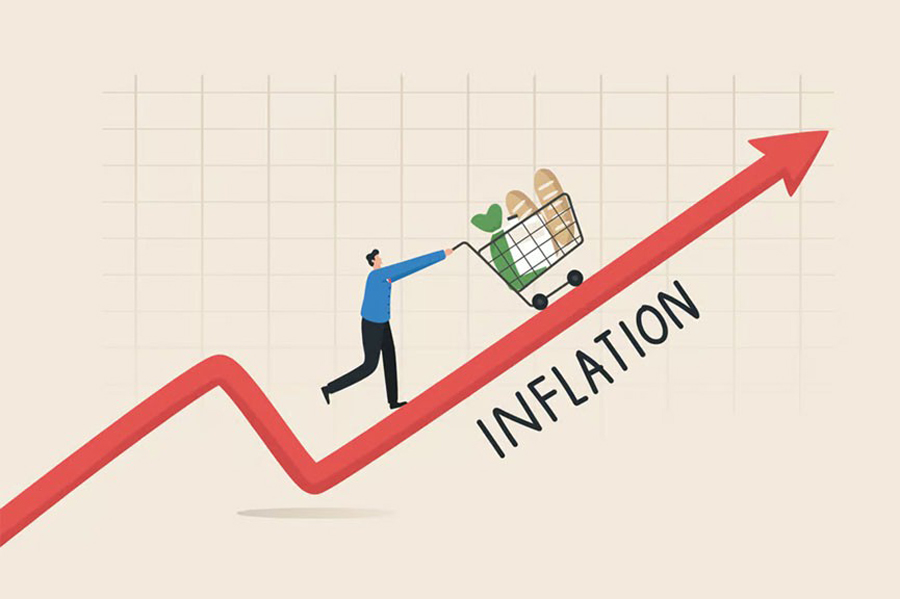
Published :
Updated :

The rise in interest rates on bank loans, driven by the government's efforts to control inflation, is proving to be a double-edged sword. While containing inflation is critical, the relentless increase in borrowing costs is severely hurting businesses and dampening investment. Interest rates on bank loans have surged from 7.79 per cent in July 2020 to a staggering 14 per cent this year, following a series of repo rate hikes initiated by the central bank. Since May 2022, the Bangladesh Bank has raised the policy rate ten times, with the latest increase bringing it to 9.5 per cent. Yet, despite these aggressive moves, inflation-particularly in food prices-remains stubbornly high, staying above 10 per cent since March 2023. This raises a crucial question: is inflation in Bangladesh solely demand-driven, and can it be effectively controlled through tight monetary policy?
The central bank's goal is to reduce excess demand by making money more expensive, but much of the inflationary pressure in Bangladesh appears to be driven by supply-side factors. Raising interest rates, therefore, is unlikely to significantly lower the prices of essential commodities. Other policy tools such as improving supply chains, reducing import costs, lowering domestic production costs, and curbing market manipulation and extortion are crucial in combating cost-push inflation.
While the intention of the central bank is well-meaning, there is a growing concern that their actions may well be exacerbating economic woes rather than solving them. The high interest rates are already suffocating investment, with business leaders warning that the cost of capital is making it impossible for industries to remain viable. The current double-digit interest rates are pushing businesses to the brink, reducing profitability, and deterring foreign direct investment - both of which are essential for economic growth. Job creation has stalled, and if this continues, the economic slowdown will deepen, further eroding stability.
As the president of the Leather Goods and Footwear Manufacturers and Exporters Association, Syed Nasim Manzur, aptly noted, no country can expect businesses to thrive with double-digit interest rates. The higher costs of capital are squeezing profit margins, reducing global competitiveness, and deterring foreign direct investment (FDI), which is vital for modernising industries and integrating them into global value chains. The compounded effect of rising interest rates is particularly devastating for export-oriented sectors, as they are struggling with higher input costs in an already competitive global market.
The decline in private investment in Bangladesh is evident from the significant drop in letters of credit (LCs) for imports. According to data from Bangladesh Bank, LC openings for imports fell by 12.85 per cent in the first two months of the fiscal year 2024-25, standing at $10.03 billion in July and August, down from $11.51 billion during the same period last year. Similarly, LC settlements during this time dropped by 13.03 per cent. This reduction in trade finance mirrors the overall slowdown in private sector credit growth, which dipped to 9.84 per cent in June 2023 from 10.58 per cent a year earlier. These indicators reflect a broader contraction in investment activity, highlighting challenges for economic growth.
As investment stalls, so does job creation, leading to stagnation in employment opportunities and economic growth. High interest rates are also worsening the issue of non-performing loans, as businesses struggle to meet their repayment obligations under increasingly burdensome financial conditions. Despite these disquieting signals from the economy, the message from the central bank is clear: the repo rate could rise further if inflation doesn't come down. This means businesses will have to brace for even higher borrowing costs. However, there are fears that if the underlying issues in the supply chain and market manipulation are not adequately addressed, the central bank's monetary tightening measure alone will only deepen the economic strain. A balanced, coordinated approach is urgently needed to combat inflation effectively while safeguarding investment and jobs.
The interim government faces a plethora of challenges, including holding trials for the murder of students and innocent people during the July uprising, repatriating laundered money, implementing reforms in various sectors, and eventually conducting elections. However, among these myriad challenges, the day-to-day lives of ordinary citizens are most impacted by the prices of essential commodities. Addressing this issue must be a priority for the government. Currently, there is hardly any vegetable item priced under Tk 100 per kg. The prices of eggs, rice, and chicken have also risen sharply.
High inflation is often described as a silent killer, and over the past two years, the people of Bangladesh have experienced its devastating effects firsthand. The rising cost of living has become unbearable for those with limited incomes. Many had hoped that the new interim government would be able to curb inflation, and there were promising initial signs. According to the Bangladesh Bureau of Statistics (BBS), inflation dropped from 10.49 per cent in August to 9.92 per cent in September. However, the market has since begun to behave erratically again, and the cost of living crisis continues to plague low- and middle-income households.
Finance Advisor Salehuddin Ahmed recently stated that the government is actively working to curb inflation and urged people to be patient. Patience, however, is wearing thin as many families glumly glare upon empty tables and struggle to make ends meet.
aktuhin.fexpress@gmail.com


 For all latest news, follow The Financial Express Google News channel.
For all latest news, follow The Financial Express Google News channel.